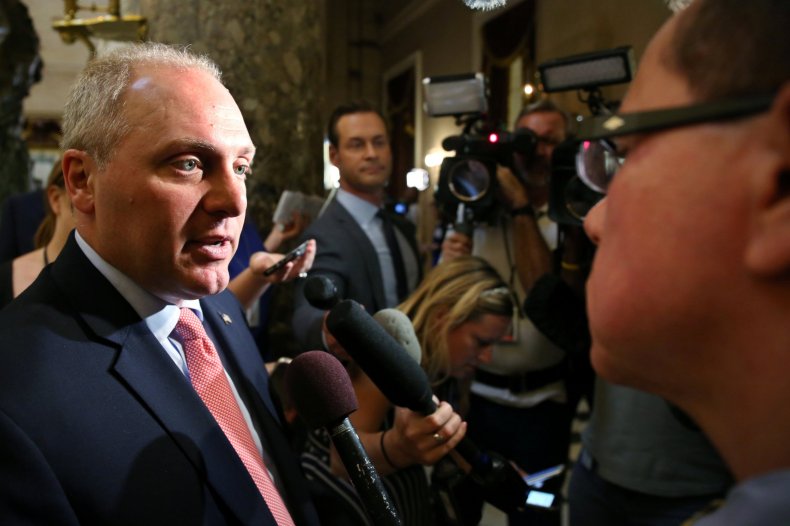The Zuckerberg-Trump Era: Challenges And Opportunities For Tech

Table of Contents
The Challenge of Misinformation and Political Polarization
The Zuckerberg-Trump era highlighted the significant role social media platforms played in spreading misinformation and fueling political polarization. The 2016 US election served as a stark example, with foreign actors using Facebook and other platforms to disseminate fake news and influence voter opinion. This era forced a critical debate surrounding content moderation and censorship.
-
The role of social media algorithms: Social media algorithms, designed to maximize engagement, inadvertently amplified the reach of misinformation. These algorithms, often opaque and complex, prioritized sensational content, regardless of its veracity, contributing significantly to the spread of false narratives.
-
The content moderation debate: Tech companies faced immense pressure to moderate content, walking a tightrope between preventing the spread of harmful misinformation and upholding principles of free speech. The question of who decides what constitutes "harmful" became a central point of contention.
-
Algorithmic bias and its impact: Studies revealed biases within algorithms that disproportionately amplified certain types of misinformation, often aligning with pre-existing political divides. This amplified the echo chamber effect, exacerbating political polarization.
-
Combating misinformation: In response, tech companies implemented various strategies, including fact-checking initiatives, partnerships with third-party organizations, and algorithm adjustments to reduce the visibility of questionable content. However, the effectiveness of these measures remains a subject of ongoing debate.
-
Ethical considerations: The ethical considerations surrounding content moderation remain complex. Striking a balance between protecting free speech and preventing the spread of harmful misinformation continues to be a significant challenge for the tech industry, demanding ongoing dialogue and refinement of policies.
Data Privacy Concerns and Regulatory Scrutiny
The Zuckerberg-Trump era intensified scrutiny of data collection practices by tech companies. The Cambridge Analytica scandal, which involved the misuse of Facebook user data, brought the issue of data privacy to the forefront of public consciousness.
-
Increased regulatory scrutiny: This period witnessed the enactment of significant data privacy regulations, such as the General Data Protection Regulation (GDPR) in Europe and the California Consumer Privacy Act (CCPA) in the US. These regulations forced tech companies to re-evaluate their data handling practices and prioritize user consent.
-
Data security breaches: High-profile data breaches during this time further fueled concerns about data security and the vulnerability of user information. The need for robust security measures became paramount.
-
Surveillance capitalism: The era saw increased debate around "surveillance capitalism," a term describing business models that profit from the extensive collection and analysis of user data. Ethical concerns around the exploitation of user information for commercial gain emerged as a significant challenge.
-
Antitrust regulations: The dominance of large tech companies also came under increased scrutiny, leading to discussions about antitrust regulations and the need to promote competition within the industry. Concerns about monopolies and the potential for anti-competitive behavior intensified.
Political Influence and the Tech Industry's Social Responsibility
The Zuckerberg-Trump era highlighted the significant influence of tech companies on political campaigns and policy-making. Concerns arose about lobbying efforts by tech giants and their impact on legislation.
-
Influence on political campaigns: The use of targeted advertising on social media platforms raised questions about the influence of tech companies on electoral outcomes. The potential for manipulation and the lack of transparency became major concerns.
-
Lobbying efforts: Tech companies engaged in extensive lobbying activities, influencing policy decisions related to data privacy, antitrust regulations, and other issues relevant to their business interests.
-
Corporate social responsibility: The era saw a growing recognition of the need for corporate social responsibility within the tech industry. The focus shifted towards ethical considerations and the importance of aligning business goals with societal values.
-
Balancing profit and ethics: Tech companies faced the challenge of balancing profit maximization with ethical considerations, navigating the tension between shareholder interests and the broader societal impact of their actions.
-
Rebuilding public trust: The events of this era significantly eroded public trust in the tech industry. Rebuilding that trust requires transparency, accountability, and a demonstrable commitment to ethical practices.
Opportunities for Technological Innovation and Adaptation
Despite the challenges, the Zuckerberg-Trump era also presented opportunities for technological innovation and adaptation. The need to address the issues raised during this period spurred the development of new technologies and approaches.
-
AI and machine learning: AI and machine learning emerged as crucial tools in combating misinformation, improving content moderation, and enhancing data security. These technologies offer potential solutions to many of the challenges highlighted during this era.
-
Cybersecurity advancements: The increasing sophistication of cyber threats necessitated significant advancements in cybersecurity, fostering innovation in data protection and threat detection.
-
Data analytics for policy: Data analytics offered opportunities to inform policy-making and improve public discourse, providing insights into the spread of misinformation and the dynamics of political polarization.
-
Promoting democratic values: Technology can play a crucial role in promoting democratic values and civic engagement, empowering citizens and fostering informed public debate.
Conclusion
The "Zuckerberg-Trump era" presented a complex interplay of challenges and opportunities for the tech industry. Navigating misinformation, addressing data privacy concerns, managing political influence, and fostering technological innovation are all critical tasks that require a multi-faceted approach. The industry's response will significantly shape the future of technology and its impact on society. Understanding the lasting implications of the Zuckerberg-Trump era is crucial for navigating the future of technology. Continue learning about the challenges and opportunities in this evolving landscape and engage in thoughtful discussions about the ethical responsibilities of the tech industry to build a safer, more informed digital world. Further research into the complexities of the Zuckerberg-Trump era will be essential for shaping responsible tech policies.

Featured Posts
-
 Solve The Nyt Mini Crossword Answers For March 22
May 20, 2025
Solve The Nyt Mini Crossword Answers For March 22
May 20, 2025 -
 Navy Ethics Scandal The Fall Of A Retired Admiral Amidst Bribery Allegations
May 20, 2025
Navy Ethics Scandal The Fall Of A Retired Admiral Amidst Bribery Allegations
May 20, 2025 -
 Lufthansa Flight Operated Without Pilot For 10 Minutes Report Details Co Pilot Fainting Incident
May 20, 2025
Lufthansa Flight Operated Without Pilot For 10 Minutes Report Details Co Pilot Fainting Incident
May 20, 2025 -
 Tottenham Loanee Key To Leeds Championship Summit Return
May 20, 2025
Tottenham Loanee Key To Leeds Championship Summit Return
May 20, 2025 -
 Robin Roberts Fancy Remark Amid Gma Layoffs What It Means
May 20, 2025
Robin Roberts Fancy Remark Amid Gma Layoffs What It Means
May 20, 2025
